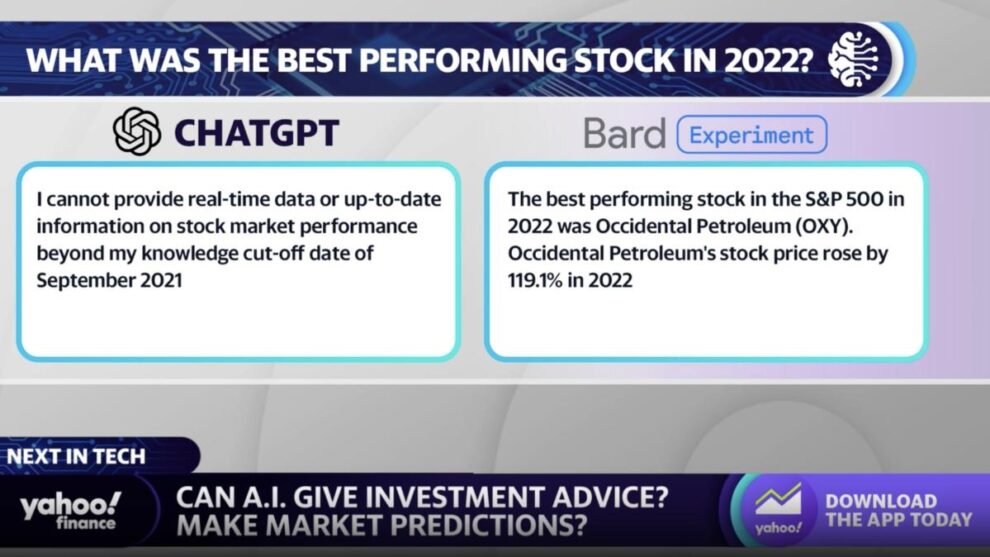DataTrek Research Co-Founder Jessica Rabe breaks down the potential for artificial intelligence services to give out investing advice, differences between Google Bard and ChatGPT answers, and how regulators may be expected to respond.
Video Transcript
RACHELLE AKUFFO: Let’s also take a look at generative AI models. We know they’ve exploded in popularity in recent months, and professionals across the working world have been incorporating bots like ChatGPT and Bard into their workflows. But what about Wall Street? Can AIs make stock picks or market predictions?
To discuss, we’re joined by DataTrek Research Co-Founder Jessica Rabe. Jessica, thank you for joining me. So a lot of people want to sort of go straight into the races when it comes to generative AI. But you have to kind of take it with a grain of salt in terms of how you expect it to be used when it comes to Wall Street and banking and– and financial advice. What are your big takeaways there?
JESSICA RABE: Yeah, absolutely. We look at disruptive technologies every day at DataTrek. And certainly, generative AIs was one of the most interesting technologies we’ve seen over the last decade. So we went to both open AIs, ChatGPT and Alphabet’s Bard, and we asked both AI models a slew of investment questions to see how they’d respond. And our overall takeaway is that they have a long way to go in terms of being accurate, useful, and reliable investment tools for investors.
DAVID BRIGGS: All right, so earlier today, I want to mention our colleague Ines Ferré spoke with the University of Florida Business School Professor Alejandro Lopez about this. Listen to what he had to say.
ALEJANDRO LOPEZ-LIRA: It will definitely increase the productivity of analysts in the first place, right? If you have a big technology that’s able to help you calculate thousands of headlines and just told you what the expected result is going to be, it’s probably going to make the job so much easier. So I would definitely be expecting a lot of investment professionals to incorporate this kind of artificial intelligence tools. Markets will become more efficient. As soon as everyone is using ChatGPT to predict returns, then there will be no more predictability because the market will incorporate information fairly quickly.
DAVID BRIGGS: Jessica, your thoughts on the professor’s characterization?
JESSICA RABE: Sure. I’m sure over time as these models improve OK. But just to give you one example, we asked both ChatGPT and Bard a very simple question right off the bat, how did US stocks perform last year?
ChatGPT could not be further off. It said that US stocks, or the S&P 500 in particular, rallied 27% last year and was actually up for the fifth year in a row. Well, obviously stocks had a very poor 2022. And even if stocks were up last year, it would have only been the fourth straight positive year in a row, not the fifth, because US equities are actually down on a total return basis in 2018.
Now, Bard was more accurate. Bard said that the S&P 500 had a bad year. It was down 19.4% last year, and that was correct. However, it didn’t decipher that was on a price return basis, not a total return basis. But even still, more accurate than ChatGPT.
So that just goes to show that, yes, it’s an interesting technology if investors want to use it in their investment process and see how the technology develops over time. We certainly understand that. However, you really have to do your homework. And you really have to fact check their answers because their accuracy can be spotty.
RACHELLE AKUFFO: And you also did ask about predictions for best-performing and worst-performing stocks and how the market was going to fare as well. We did see that ChatGPT didn’t really seem to be willing to give an answer there, a little bit coy, if AI can be coy, whereas Bard at least was making some projections. What is the difference then in terms of investors? Is it better to not rely on Bard’s advice versus ChatGPT saying, look, this isn’t our area of expertise past a certain date?
JESSICA RABE: Yeah, you raise a great point. They give very different answers, whether it be– so ChatGPT refuses to give recommendations, whether that’s on an individual name basis or on a sector basis. It says it cannot predict the future, and it really airs on the side of compliance, just encouraging investors to perform careful research and analysis.
Bard, however, is very willing to give recommendations. So, for example, when we asked, what stocks do you think will outperform in Q2, Bard gave five names as well as a couple of sentences as to why. They are all big tech. We would point out, though, however, that Alphabet was on the list. Now, of course, Alphabet owns Bard, so we don’t think SEC regulators would look too fondly on Bard recommending the stock of its parent company, especially having not disclosed the relationship.
Another thing we asked was, which stocks do you think will underperform in Q2? And Bard also gave five names for that. However, another thing we found curious was it included Cruise on the list and gave the symbol CCL and referred to it as an electric vehicle company. Now, Cruise is, of course, an electric vehicle unit of GM. But CCL, the symbol, is actually Carnival, the cruise line. So very– very different companies.
DAVID BRIGGS: Yeah, indeed. So are they covering their legal bases? Is there fine print that just suggests no one take financial advice from either one?
JESSICA RABE: I think they’re both figuring it out. Certainly, ChatGPT gives very generic responses, ones that are more out of an economic textbook and won’t get them in hot water with regulators. So, for example, it doesn’t give stock or sector recommendations. Bard, however, we certainly saw that not all of its responses were in the spirit of current US securities regulations. And the– recommending Alphabet stock is just one example of that.
DAVID BRIGGS: Of course, like everything else, it’s moving at light speed. And what we’re saying right now may be irrelevant in a couple of months, right, Jessica? Good to see you. Thanks so much. Very interesting topic.






